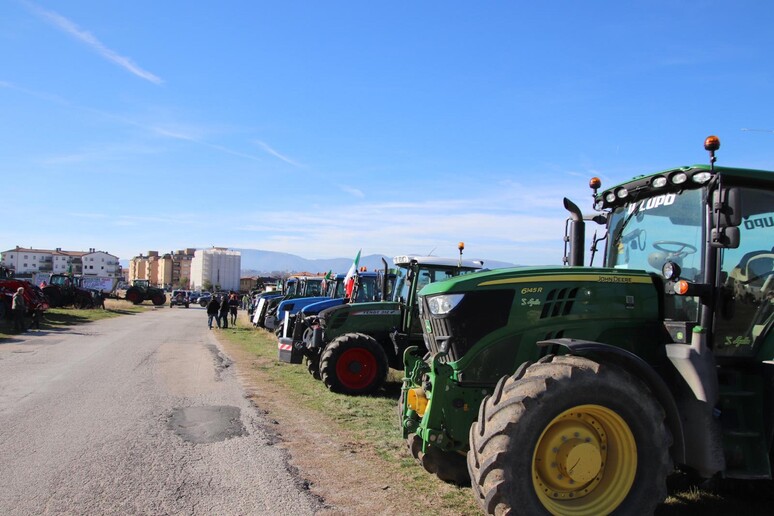For weeks now, farmers across the
continent have taken their anger and worry about their
livelihoods to the streets. After protests in front of the
European Parliament in Brussels on Wednesday, European
Commission president Ursula von der Leyen opened the Strategic
Dialogue on Agriculture the following day.
Europe's farmers are in revolt and their anger is growing: The
fury has led to road blockages and tractor parades in the past
few weeks, with farmers taking their protests to the street in
France, Germany, Lithuania, Poland and Romania, and the
Netherlands before that.
While farmers have protested over national issues, concerns over
increasing challenges facing agriculture including extreme
weather, bird flu and surging fuel costs are uniting them.
Another source of discontent is over what farmers say is
excessive regulation, also on European level. Then there is the
influx of Ukrainian agricultural products into the EU since the
lifting of customs duties in 2022. The European Commission must
soon reveal its intentions on the renewal of the customs
exemption, which expires in June.
The agricultural question, in light of the European Parliament
elections in June and surveys showing a surge of the far-right
and nationalists who take up agricultural issues fervently, is
important. Farmers are a "very important electorate", said EU
lawmaker and vice-president of the parliament's socialist
grouping, Pedro Marques.
On Thursday, European Commission president Ursula von der Leyen
- aiming at defusing the anger - launched a new strategic
dialogue format that brings together farmers, environmental
organisations and industry to develop solutions to the problems
of agriculture in Europe. According to the German politician,
everyone agrees that the challenges are increasing.
Among the main issues are topics such as farmers' income,
sustainability, technological innovation and competitiveness.
These were also discussed at the meeting of the EU's
agricultural ministers at the Agricultural and Fisheries Council
(AGRIFISH) on Tuesday. Concerns that the green transition will
wreak further havoc for farmers are also part of the program.
The dialogue at EU level aims to develop new solutions and
achieve a common vision by summer 2024 and present this to the
EU Commission. The initiative, only confirmed at the end of last
week, was promised by von der Leyen last September, calling for
"less polarisation" and assuring that "agriculture and nature
protection can go hand in hand".
Powerful agri-group Copa-Cogeca said it was a "welcome
initiative, albeit one which has been slow to materialise",
adding that "the scope of the discussions remains particularly
vague".
Protests across Europe
A day prior, on January 24, demonstrations were held in front of
the European Parliament in Brussels. "The demonstrations will
grow because discontent is growing and this will affect the
European elections," French farmer Stéphane Bleuzé said during
the protests. "We came to Brussels because this is where the
rules that affect us are decided."
The leader of the French right-wing Reconquête movement, Marion
Maréchal-Le Pen, niece of Marine Le Pen, attended the Brussels'
protest on Wednesday criticising EU agriculture policies.
The Flemish trade union Algemeen Boerensyndicaat (ABS) said that
"today's action is yet another cry for help" and that "farmers
don't ask for much, just to fulfil their social role and to be
treated fairly".
In Germany, for example, angry farmers have for weeks been
protesting over diesel fuel subsidy cuts, including with mass
demonstrations in several cities in which farmers blocked
traffic with tractors and other pieces of farm equipment. The
government agreed to soften the measure by phasing out the
diesel fuel subsidy over three years, instead of immediately,
but has otherwise stuck by the policy. Chancellor Olaf Scholz's
coalition has been under pressure to raise tax revenue or cut
spending to close a major budget gap. The nationwide farmers'
protests sparked a discussion about the extent to which farmers
are being exploited for the interests of far-right parties.
In neighbouring Austria where citizens will vote in national
elections in autumn, the right-wing FPÖ organised a farmers'
demonstration last week. The farmers' association of the
conservative ÖVP, in response, criticised that the party was
"instrumentalising the farmers for its own party purposes" and
distanced itself from the "election campaign games at the
expense of the farmers".
In France, the growing anger of French farmers is shaping up to
be the first major challenge of President Emmanuel Macron's
newly appointed government. The new Prime Minister Gabriel Attal
paid tribute to the country's agriculture sector last weekend,
responding to the growing discontent of farm workers. A reform
package designed to meet some grievances has been postponed for
fine-tuning. MEP Jordan Bardella who will lead the far-right
National Rally into the June elections claimed there is growing
anger against "the European Union and the Europe of Macron", who
according to Bardella wanted "the death of our agriculture".
Some political observers think it could pose a major challenge
to France's mainstream parties.
ALL RIGHTS RESERVED © Copyright ANSA











